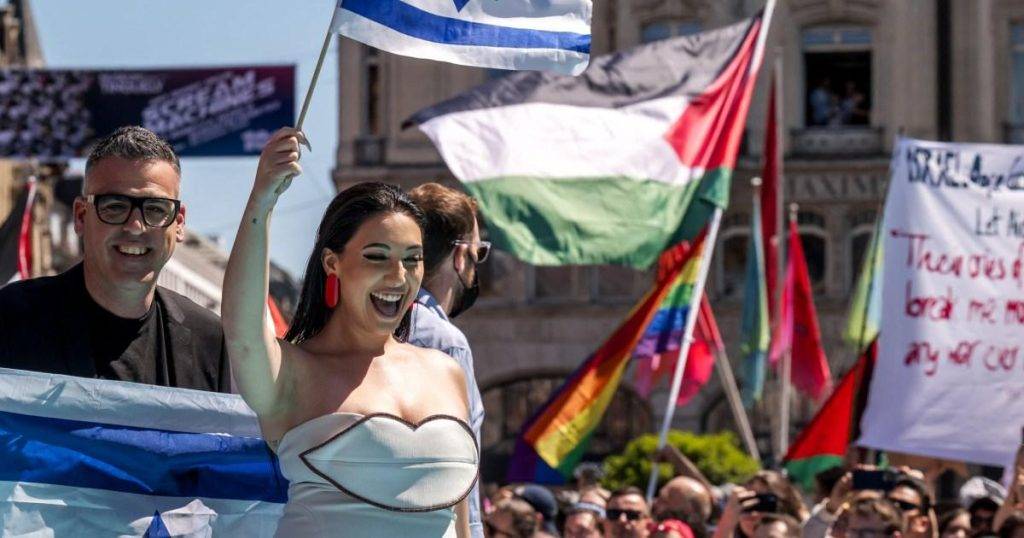Cliff Notes – Eurovision faces police complaint after ‘throat-slitting’ gesture at opening ceremony
- An Israeli broadcaster, Kan, has filed a police complaint after a man made a throat-slitting gesture during the Eurovision 2025 opening ceremony, while Israeli singer Yuval Raphael was present.
- The incident has led to security concerns for Raphael, who will not be giving interviews, and has sparked controversy over Israel’s participation in the contest, with calls for the exclusion of Kan from future events.
Eurovision faces police complaint after ‘throat-slitting’ gesture at opening ceremony
Israeli singer Yuval Raphael faced a threatening gesture at the opening ceremony (Picture: Fabrice COFFRINI / AFP) (Photo by FABRICE COFFRINI/AFP via Getty Images)
An Israeli Public Broadcaster, Kan, has filed a police complaint after a ‘throat-slitting’ gesture appeared in the opening ceremony of Eurovision 2025.
In the video, a man can be seen holding a Palestinian flag and making a gesture that looks like a throat-slitting motion, as the Israeli Eurovision act, Yuval Raphael, 24, walks past him during the turquoise carpet event.
Kan immediately responded by filing an official complaint with the Swiss police in Basel, Malmö, where the 69th Eurovision song contest final will take place
The broadcaster also reportedly contacted EBU (European Broadcasting Union), requesting the identification of the individual and his removal from all activities related to the contest.
It was later announced that Raphael, Israel’s representative in the competition, would not be giving interviews to accredited journalists.
It has been reported that this was because of security reasons.
Raphael is an Israeli singer who only began singing professionally in 2023.
In November 2024, Raphael’s audition for the eleventh season of Israeli interactive reality singing competition, HaKokhav HaBa.
The contest served as the Israeli artist selection for the Eurovision Song Contest 2025.
The singer survived the October 2023 Hamas massacre at the Nova music festival near the Gaza border.
Yuval Raphael representing Israel with the song New Day Will Rise walks on the turquoise carpet next to the Basel Town Hall (Picture: FABRICE COFFRINI/AFP via Getty Images)
Israel first joined the live music event in 1973, and became the first participant not located geographically in Europe.
The EBU emphasised that Israel is allowed to compete in the competition as the country is represented by Kan and not its government.
The country’s participation in the show has been controversial and a new open letter has demanded that Kan be banned.
In an open letter to the European Broadcasting Union (EBU), 72 musicians, lyricists and performers associated with the contest called for the exclusion of Kan, Israel’s public broadcaster.
The letter alleged the broadcaster was ‘complicit in Israel’s genocide against the Palestinians in Gaza and the decades-long regime of apartheid and military occupation against the entire Palestinian people.’
Raphael is a survivor of the deadly Hamas attack on the Nova festival (Picture: via REUTERS)
The open letter also accuses Eurovision organisers of ‘whitewashing and normalising [Israel’s] crimes’ by ‘continuing to platform’ the country and for a ‘double-standard’ after expelling Russia from the competition in 2022.
Follow Metro on WhatsApp to be the first to get all the latest news
Follow us to receive the latest news updates from Metro (Picture: Getty Images)
Metro’s on Whatsapp! Join our community for breaking news and juicy stories.
A spokesperson for the EBU said in a subsequent statement: ‘We understand the concerns and deeply held views around the current conflict in the Middle East. The EBU is not immune to global events but, together with our members, it is our role to ensure the contest remains, at its heart, a universal event that promotes connections, diversity and inclusion through music.
‘We all aspire to keep the Eurovision song contest positive and inclusive and aspire to show the world as it could be, rather than how it necessarily is.’
It marks the latest point of tension in Eurovision’s ongoing challenge to reconcile cultural celebration with political reality, following Switzerland’s decision to ban artists from taking Pride flags on stage.


